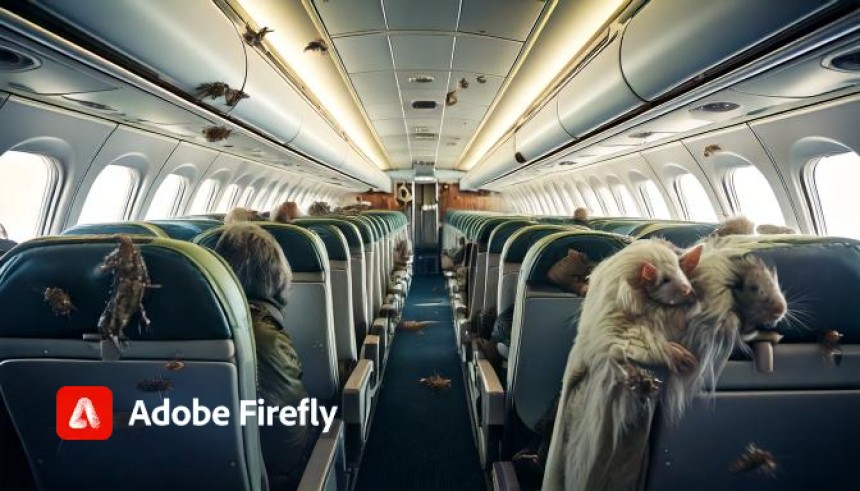
Roaches, mice and mold:
What is happening to airplane food?
The transatlantic flight from London departed at breakfast time, and Joyce Beadling was hungry. Her friend warned her that the fruit salad tasted funny. But, trapped on a plane for hours, she had few options. So she ate her meal, plus her friend’s produce.
The following evening, she regretted it.
“It felt like my guts were being ripped out,” said Beadling, 69, a retired nurse from Rochester, Minnesota.
Beadling believes the meals on her Sept. 22 Delta Air Lines flight landed her in the emergency room. Her pal, Catalina Lewis, 45, also fell ill and tested positive for three types of E. coli, according to results she shared with The Washington Post.
The Minnesota travelers are two more voices in a growing chorus of groans over airplane food. Though the airlines serve thousands of harmless meals a day, several incidents this year have turned travelers’ stomachs.
These issues are more serious than the usual complaints about flavorless dishes and limited options, exposing problems with safety standards and quality control. The same concerns have fueled Americans’ widening distrust of the food system; The Centers for Disease Control and Prevention recently linked E.coli to raw onions on McDonald’s Quarter Pounders and listeria to Boar’s Head deli meat.
Some recent in-flight meal offenses:
- On a July flight from Detroit to Amsterdam, some Delta passengers were served spoiled meals with allegedly moldy chicken that sickened more than a dozen fliers. Out of utmost caution, the pilots diverted to New York’s JFK airport. Delta terminated its contract with the supplier.
- In September, an Air India passenger flying from Delhi to New York tweeted they had discovered a dead cockroach in her omelet. The airline confirmed the incident to Fox Business but did not reply to a request for comment about how it responded.
- Also that month, a mouse scampered out of a meal on a Scandinavian Airlines flight from Norway to Spain and scurried off. The pilot rerouted to Copenhagen, because rodents can be destructive and chew on wires. “The safety of our colleagues and passengers is always our priority number one, also when it comes to in-flight meals and procedures around how to handle these” said Alexandra Lindgren Kaoukji, an SAS spokeswoman, who confirmed the sighting.
- In October, a Food and Drug Administration inspection cited food safety concerns at Delta’s catering facility at Detroit Metro Airport in Michigan. The airline decided to switch to another facility for its hot meal service and suspend all operations from the Detroit kitchen until further notice. The FDA would not comment on the investigation because it is an open case.
Such egregious failings are rare, but food safety experts say tainted airplane food could be more ubiquitous than reported.
“Airline passengers should be aware of food safety issues in the in-flight catering industry,” Darin Detwiler, a food safety adviser and associate teaching professor at Northeastern University in Boston, said by email, “because the confined nature of airplane travel makes foodborne illness outbreaks especially challenging to manage.”
For the London flight, Lewis, a nurse, reported the food poisoning to Delta and the Minnesota Department of Health. In a statement to The Post, Delta said it was not aware of any other reports about food safety concerns from that flight, and it was reviewing the details that had been shared. Minnesota’s agency said it is not investigating an outbreak linked to airline food.
Though fully recovered, Beadling is still unsettled by the experience and its greater implications.
“Somebody someplace is not doing the proper procedure of washing their hands and wearing gloves,” said Beadling, who has sought legal counsel. “This is a system problem that needs to be addressed.”
As a foodborne illness attorney, Bill Marler has handled several airline food cases during his 31-year career. One of his biggest was against Gate Gourmet, the catering company that, in 2004, served contaminated carrots on several flights traveling from Honolulu to 22 states, Japan, Australia and American Samoa. About 45 people were stricken with food poisoning caused by a strain of the Shigella bacteria.
The Hawaii Department of Health investigated the outbreak, and the FDA inspected Gate Gourmet’s facility, uncovering a number of violations, such as improper storage temperatures, ungloved contact with food and the presence of pests and vermin. Gate Gourmet admitted fault and, in a settlement, awarded an undisclosed sum to the victims represented by Marler’s firm, Marler Clark.
Marler recently decided to represent Beadling.
Detwiler also maintains a catalogue of airline catering infractions and public health hazards, such as a 2010 detection of Listeria monocytogenes in food samples prepared by LSG Sky Chefs; a 2019 probe of United Airlines’s food safety procedures, prompted by passenger complaints about feeling sick from in-flight dining; and 2021 reports of unsanitary practices by a caterer that provides meals for British Airways.
Travelers might accept gastrointestinal symptoms as one result of subjecting your body to new environments; E. coli’s street name is traveler’s diarrhea, after all. Or they might be hopping around so much, they can’t pinpoint the culprit.
“Tracking issues with airline foods can be really difficult, because the people on the plane are probably going to different destinations,” said Ellen Shumaker, director of outreach for the Safe Plates program at North Carolina State University. “It’s hard to remember what you ate, especially when you’re traveling, and it’s harder to trace it back.”
In the United States, the Food and Drug Administration oversees inspections of “passenger-carrying conveyances,” such as airplanes, and their “support” facilities, which include caterers.
The FDA Food Safety Modernization Act requires routine inspections at least once every three years for domestic high-risk facilities and once every five years for non-high-risk venues. The agency said the risk level is based on food type, manufacturing process and the facility’s compliance history.
“FDA inspectors are looking for temperature controls, cleanliness and sanitation, how the food is being handled and pest control,” Shumaker said.
On several occasions, Detwiler said, the FDA has written up two of the industry’s largest catering companies, LSG Sky Chefs and Gate Gourmet. Transgressions included improper temperature control, pest infestations and cross-contamination concerns. Depending on the circumstances, the agency will require the company to take corrective actions and pay a fine.
Some detailed FDA reports are available to the public. But warning: They are not suitable for the breakfast table.
In a 2018 warning letter to a Gate Gourmet facility in Kentucky, the agency called out the company for food residue on can openers, standing water by a gas range, accumulation of grease, food deposits and general filth on equipment. It also reported live cockroaches by the oven and dishwashing area and dead roaches “too numerous” to count.
Gate Gourmet said it has made significant changes in the years since that event and others took place. LSG Sky declined to be interviewed.
Airlines rely on a vast network of global suppliers and catering companies that typically operate out of industrial kitchens located near an airport. The catering staff can prepare thousands of meals a day for the different seating classes, special diets and dining times.
Unlike restaurant food, which is hastily delivered to the table, in-flight meals can sit for hours before being consumed.
“The airlines work a bit differently, and that adds some complications,” Shumaker said.
Kinks can occur at several points along the chain. The high volume and fast pace of meal production can increase the risk of cross-contamination and food-handling blunders, Detwiler said. Employees may not sufficiently scrub the facility or adequately wash their hands, one way to spread norovirus.
On the ground and in the air, meals must be kept at a controlled temperature or they could spoil and mold could bloom. People can become infected with pathogens when food is not cooked, cooled, reheated and/or stored at the correct temperature, explained Carlota Medus, an epidemiologist who supervises the Foodborne Diseases Unit of the Minnesota Department of Health.
Roaches and mice can find stowaway opportunities at facilities with lax pest control. Medus called vermin a “big red flag” for substandard hygienic practices.
To minimize food contamination, airlines and their catering companies have created multiple layers of safety protocols and quality monitoring systems.
Newrest Group, which provides worldwide catering for such major airlines as Air France, Delta and United, adheres to three regulatory arms, said Fabien Malbranque, the company’s group quality, health, safety and environment director. The French company complies with procedures established by federal and state agencies in addition to ones prescribed by the airline, including independent audits. Newrest also follows its own voluntary internal requirements based on industry and International Organization for Standardization criteria.
“We inspect every day the food quality and safety of the products,” Malbranque said. “On a monthly level, we inspect our food safety management system, and almost a week every year we audit our operations from a quality and food safety perspective.”
If an issue arises, he said his team can determine in less than two hours which flights are carrying the compromised food. The company is investing in digital programs, automatization, robots and AI, all of which will help track in-flight meals circling the globe.
In a statement to The Post, Gate Gourmet, the largest airline catering company in the United States, said its kitchens are regularly audited by airlines and regulatory agencies; the number of audits has surpassed 300 this year. The company said it has invested in technology and bolstered its compliance staff, in addition to its standard safety features.
During a visit to the Washington Dulles facility last year, a reporter noticed handwashing stations, foot-cleaning pads, hairnets and smocks, and food temperature TV monitors.
When an airline discovers compromised food, it usually leaps into action.
In the case of the mouse, Scandinavian Airlines said it fumigated the aircraft and ordered a full inspection of its suppliers’ processes.
On the Delta flight with the moldy meal, the airline’s food safety team quickly identified and removed the offending product, which a supplier had shipped frozen to the Detroit kitchen.
Medus, who eats airplane meals, said it is generally safe. However, travelers can take some precautionary measures.
Detwiler recommends eating packaged snacks or dry goods, which are often safer than perishables. He said to be wary of uncooked items such as salads and cold sandwiches, which can be susceptible to contamination, and dishes that can easily spoil, such as meat-based entrées. He also avoids ice. A few years ago, he learned from a food safety expert that airlines do not clean their ice machines. “This results in ice testing positive for pathogens,” he said.
After her unpleasant in-flight dining experience, Beadling isn’t taking any chances. On a flight to New Hampshire, she and her husband carried food from home and bottled water from an airport vending machine.
“I told my husband, ‘Don’t you dare order anything,’” she said. “Not even coffee.”
Orginal article courtesy of yahoo news
For related streaming videos,visit wowzatv.network





